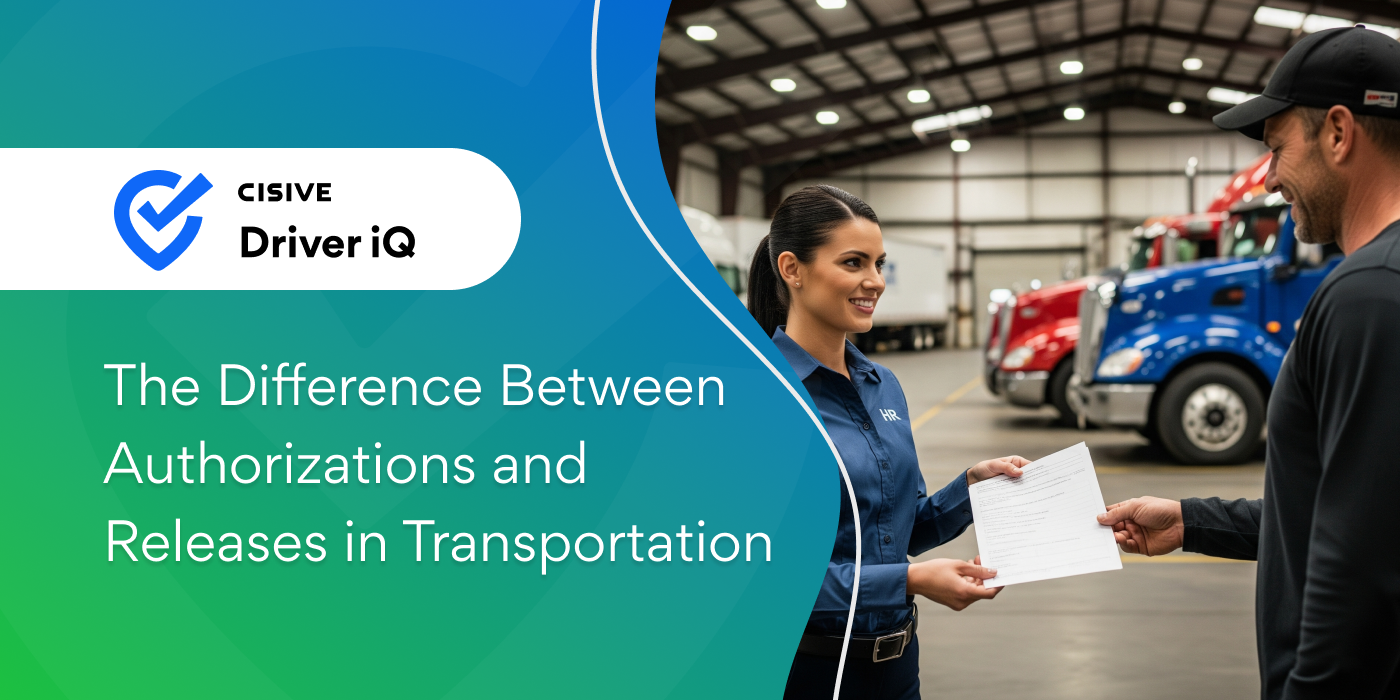

Easton, Md. — January 15, 2026 - Cisive, a leading provider of technology and compliance-driven...

In background screening, the disclosures, authorizations, and release forms might seem like a small detail. But in reality, they play a big role in protecting both employers and candidates. In regulated industries like transportation, overlooking an authorization or a release requirement can have serious consequences.
In this blog, we will explain the difference between a Disclosure & Authorization (D&A) and a Release of Information, why they matter, who requires them, and how Cisive Driver iQ helps ensure your compliance is never in question.
Before diving deeper, it's important to distinguish between two critical types of consent forms involved in background screening: the federal Disclosure & Authorization (D&A) and state-specific Motor Vehicle Record (MVR) Releases.
The Fair Credit Reporting Act (FCRA) mandates that employers provide a clear and conspicuous written disclosure to job applicants or employees when intending to procure a background check through a Consumer Reporting Agency (CRA) like Driver iQ. This disclosure must be presented in a standalone document, separate from other employment materials, and must inform the individual that a consumer report (which sometimes includes driver’s license and motor vehicle violation information) may be obtained for employment purposes. The employer must also obtain the individual's written authorization before proceeding with the background check.
In addition to the federal requirements, certain states impose their own regulations concerning the release of driving records. For instance, states like Washington require the specific “Driving Record Release of Interest” form to be signed by the individual before the employer can access their driving records. These state-specific forms are separate from the FCRA's D&A and are necessary to comply with local laws governing the privacy and dissemination of motor vehicle records.
Understanding and adhering to both federal and state requirements is crucial for employers, especially those in regulated industries like transportation, to ensure full compliance in their background screening processes.
Depending on what type of screening is being done, additional D&As or other Release of Information forms may be required. Some D&As cover pre-employment only, while others may include language that allows for post-hire screening (such as ongoing driver monitoring) or other annual checks (such as MVRs or criminal checks).
A release is a candidate-signed document that authorizes an employer to run a background check on a job candidate or employee. Under the Fair Credit Reporting Act (FCRA), this disclosure and authorization must be provided in writing and signed before any reports can be run.
Depending on what type of screening is being done, additional releases may be required. Some releases cover pre-employment only, while others may include language that allows for post-hire screening, such as ongoing driver monitoring or other annual checks, such as MVRs or criminal checks.
Releases ensure transparency for candidates and give employers the legal permission to proceed with the background check.
D&As and Releases serve several important functions:
Failure to obtain and retain the correct authorizations and releases can put an employer at risk of fines, lawsuits, or even being blocked from running reports, especially in states like Washington and California.

Most employers are familiar with the FCRA requirement for background check authorizations. But several states and federal agencies have additional rules:

Noncompliance can have serious consequences. A few examples:
Bottom line: even small oversights can become major liabilities.
At Driver iQ, we help clients navigate release requirements as part of our end-to-end compliance support. Here's how:
While we always recommend clients seek legal counsel for final approval of their forms, we provide the knowledge and tools they need to stay on track.
In highly regulated industries, compliance isn't optional. It starts with the basics, including providing examples of a federal Consumer Report Disclosure and Authorization, and when needed or required, a Release of Information. When handled properly, the forms work together protect and inform all parties involved and keep your hiring process running smoothly.
At Driver iQ, we help you eliminate blind spots so you can focus on building the safest, most qualified team possible.
Ready to simplify screening without sacrificing compliance? Let’s talk.
Author: Cisive Staff
Bio: Contributed by a member of our staff with expertise in background screening for highly regulated industries.
Let's Connect on LinkedIn
Easton, Md. — January 15, 2026 - Cisive, a leading provider of technology and compliance-driven...

In today’s competitive job market, employers are turning to artificial intelligence (AI) and...

Ensuring you have the right people to fill key roles in your company is more complex than ever....